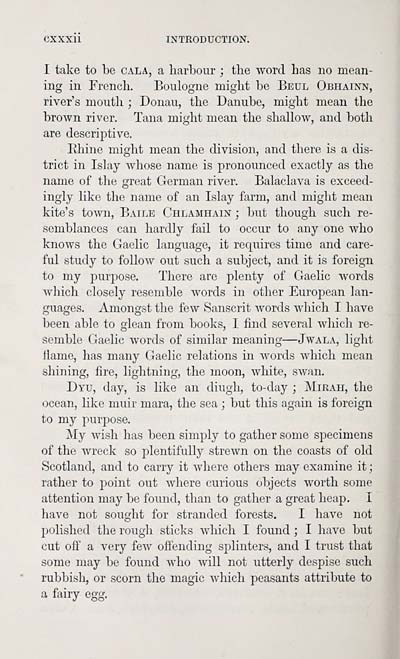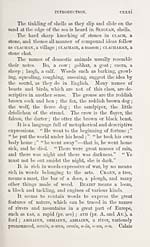Download files
Complete book:
Individual page:
Thumbnail gallery: Grid view | List view

CXXXU INTRODUCTION.
I take to be gala, a harbour ; the word has no mean-
ing in French. Boulogne might be Beul Obhainn,
river's mouth ; Donau, the Danube, might mean the
brown river. Tana might mean the shallow, and both
are descriptive.
Rhine might mean the division, and there is a dis-
trict in Islay whose name is pronounced exactly as the
name of the great German river. Balaclava is exceed-
ingly like the name of an Islay farm, and might mean
kite's to^vn, Baile Chlamhain ; but though such re-
semblances can hardly fail to occur to any one who
knows the Gaelic language, it requires time and care-
ful study to follow out such a subject, and it is foreign
to my jiurpose. There are plenty of GaeHc words
which closely resemble words in other European lan-
guages. Amongst the few Sanscrit Avords which I have
been able to glean from books, I find several which re-
semble Gaelic words of similar meaning — Jwala, light
flame, has many Gaelic relations in words which mean
shining, fire, lightning, the moon, white, swan.
Dyu, day, is like an diugh, to-day ; Mirah, the
ocean, like muir mara, the sea ; but this again is foreign
to my purpose.
]My wish has been simply to gather some specimens
of the wreck so plentifully strewn on the coasts of old
Scotland, and to carry it where others may examine it ;
rather to point out where curious objects worth some
attention may be found, than to gather a great heap. I
have not sought for stranded forests. I have not
polished the rough sticks which I found ; I have but
cut off" a very few offending sj^linters, and I trust that
some may be found who will not utterly despise such
rubbish, or scorn the magic which peasants attribute to
a fairy egg.
I take to be gala, a harbour ; the word has no mean-
ing in French. Boulogne might be Beul Obhainn,
river's mouth ; Donau, the Danube, might mean the
brown river. Tana might mean the shallow, and both
are descriptive.
Rhine might mean the division, and there is a dis-
trict in Islay whose name is pronounced exactly as the
name of the great German river. Balaclava is exceed-
ingly like the name of an Islay farm, and might mean
kite's to^vn, Baile Chlamhain ; but though such re-
semblances can hardly fail to occur to any one who
knows the Gaelic language, it requires time and care-
ful study to follow out such a subject, and it is foreign
to my jiurpose. There are plenty of GaeHc words
which closely resemble words in other European lan-
guages. Amongst the few Sanscrit Avords which I have
been able to glean from books, I find several which re-
semble Gaelic words of similar meaning — Jwala, light
flame, has many Gaelic relations in words which mean
shining, fire, lightning, the moon, white, swan.
Dyu, day, is like an diugh, to-day ; Mirah, the
ocean, like muir mara, the sea ; but this again is foreign
to my purpose.
]My wish has been simply to gather some specimens
of the wreck so plentifully strewn on the coasts of old
Scotland, and to carry it where others may examine it ;
rather to point out where curious objects worth some
attention may be found, than to gather a great heap. I
have not sought for stranded forests. I have not
polished the rough sticks which I found ; I have but
cut off" a very few offending sj^linters, and I trust that
some may be found who will not utterly despise such
rubbish, or scorn the magic which peasants attribute to
a fairy egg.
Set display mode to: Large image | Transcription
Images and transcriptions on this page, including medium image downloads, may be used under the Creative Commons Attribution 4.0 International Licence unless otherwise stated. ![]()
| Early Gaelic Book Collections > Blair Collection > Popular tales of the West Highlands > Volume 1 > (140) |
|---|
| Permanent URL | https://digital.nls.uk/76356810 |
|---|
| Description | Volume I. |
|---|---|
| Shelfmark | Blair.173 |
| Additional NLS resources: | |
| Attribution and copyright: |
|
| Description | Orally collected, with a translation by J.F. Campbell. |
|---|---|
| Shelfmark | Blair.173-176 |
| Additional NLS resources: | |
| Description | A selection of books from a collection of more than 500 titles, mostly on religious and literary topics. Also includes some material dealing with other Celtic languages and societies. Collection created towards the end of the 19th century by Lady Evelyn Stewart Murray. |
|---|
| Description | Selected items from five 'Special and Named Printed Collections'. Includes books in Gaelic and other Celtic languages, works about the Gaels, their languages, literature, culture and history. |
|---|

